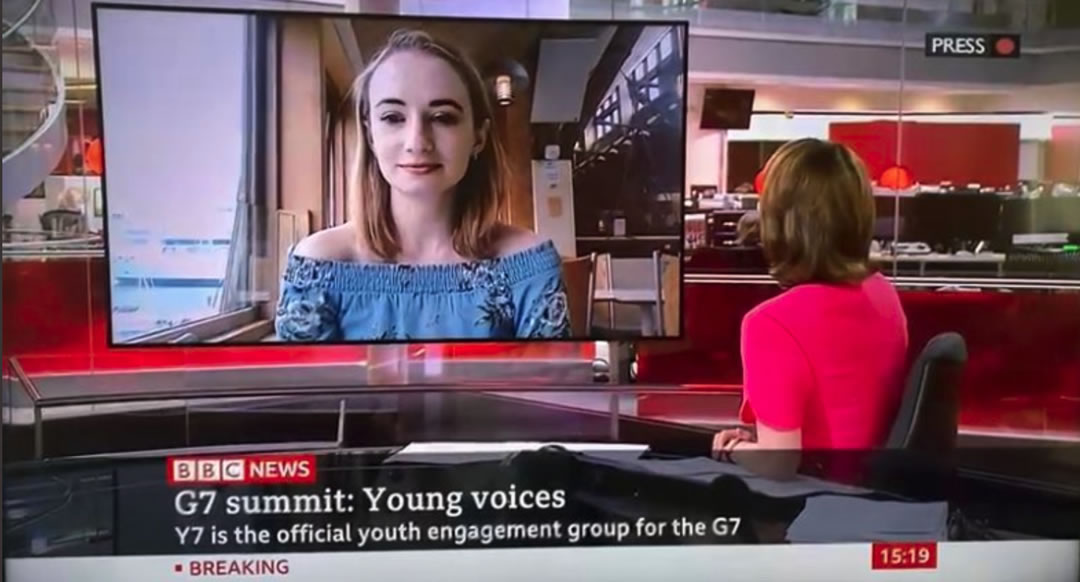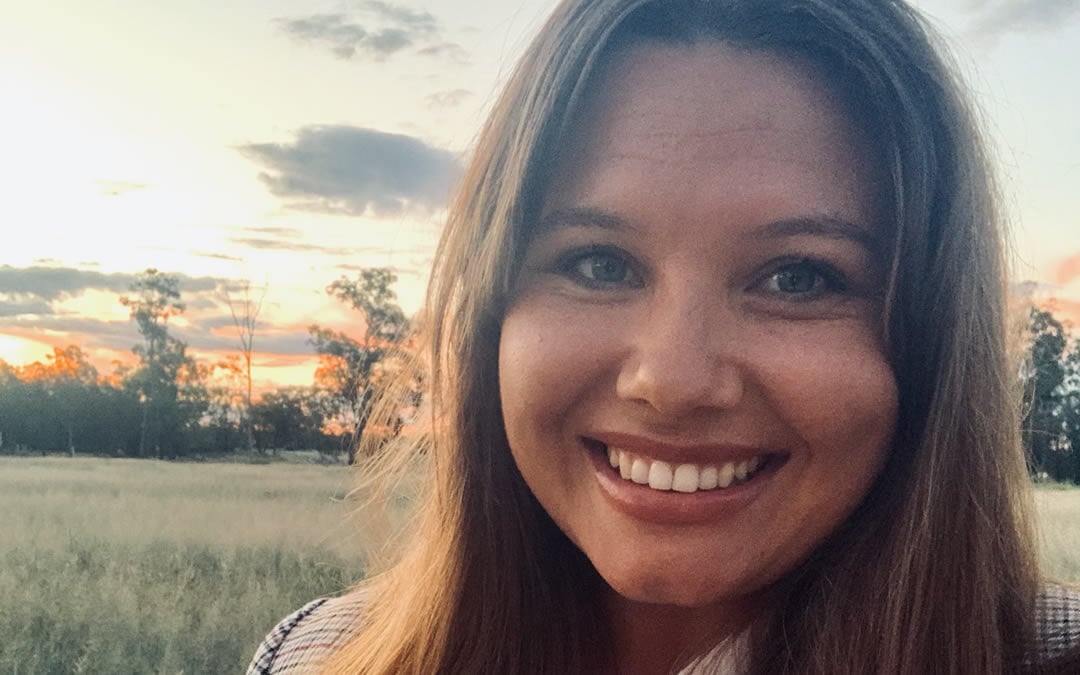Renee Cremer can remember the exact moment her dream of being a political changemaker felt achievable. It was in Paris, in 2019, where she and several others had been sent as Australian youth delegates to the Organisation for Economic Co-Operation and Development (OECD) Forum.
‘(Before then), some people were asking questions like, shouldn’t you be raising your kid?’ she said. ‘And I too – I’d thought that a career in international relations was out of the question for a young mum. I’d even begun to study degrees that I thought were more compatible with who I was meant to be.’
But for Renee, whose love for international relations ran twelve-years deep, the message opened a door she’d been considering for some time.
‘I said to myself, you know what? After this, you’re going to go back and you’re going do your politics and policy studies degree – not something different – because that’s what you love, and that’s where you’re headed. There’s no point studying something else you won’t be very happy in.’
Getting back on track
Before 2019 and the OECD, Renee’s life was on a different path.
‘When I graduated from high school I tried to pursue a degree [in international relations], but financially, it was just really difficult for me; I’d moved out of home at the start of grade 12 and I was supporting myself independently.
‘I knew I needed some financial stability first, so I got a job at a large insurance company. And I ended up doing really well there – I loved working with the team, and I was on a management track, and I was developing my own sales training. Then I met my partner and we had a daughter and everything changed. I was only 23.’
The birth of her daughter constituted a major turning point for Renee – and a chance for her to revisit her plan in life.
‘The thought of going back to work five days, six days a week, 12 hours a day didn’t feel right. And I knew I wanted to finish my higher education. But I didn’t think I could work in international relations, and so I started an education degree.’
But dreams have a strange way of slipping back in. In 2019, as she was studying her education degree, Renee connected with youth not-for-profit organisation Global Voices. It was there she submitted an application to act as Australian’s youth delegate to the OECD; the rest, as they say, is history.
‘I’m so grateful I got the opportunity to go to the OECD,’ Renee says now. ‘Because if I hadn’t, I probably wouldn’t have gone back and really realised that I needed to follow my dream.’
A dream of a more connected and politically-engaged world
Emboldened, Renee’s since chosen to apply for Deakin’s Bachelor of Arts, citing its distance education capabilities and spread of socially-minded majors and minors as well-aligned to her own interests and career goals.
‘I’d studied politics and international relations at other universities, when I first started out, but I’ve ended up really, really enjoying my time at Deakin. The professors give you the opportunity to look at these political concepts and talk about what you’re learning, to discuss how you’re understanding these complex concepts and importantly, to ask if you’re putting two and two together correctly, to apply what you’re understanding to real life.
‘They make it exciting for you. They know you appreciate seeing the crossover from theory into real life and our present day; to see how it all fit together.’
Her deeper knowledge of political theory has also helped Renee in her recent role as Australia’s sole representative to the Youth G7 2021; a group of youth leaders from the world’s seven most advanced economies who explore, negotiate and present policy suggestions to address some of the world’s most pressing issues.
‘In class, we explore the ideas of participatory and discursive democracy – which is to say, true engagement with and influence on our politics. It’s something I think we could be doing more of; even though voting is mandatory, I don’t feel like people are participating, or have the knowledge to participate in the Australian political arena with true meaning.
‘And that’s really dangerous because, as you know, we are dealing with lots of misinformation, disinformation, coercion and influence in social media, that make it so people are coerced into thinking something rather than believing it for themselves. If people aren’t able to think critically about how they’re participating in politics, are they really participating meaningfully?
‘We’ve explored things too like when you create policy, you need to consider where the policy fits; you need to view it in a matrix that considers the social, environmental, cultural and economic environments in which you’re creating it. You need to consider the impact the policy will have on future generations.’
‘Now in the Youth G7, I’m getting to actually, actively address the solutions to these issues alongside leaders from around the world. One of the key solutions we’re exploring is education – education and understanding, to my mind, is probably, the number one thing we need to achieve. And in order to make sure we’re being inclusive and building knowledge for everyone, we need to look at who we’re connecting strategically; we need to ask, well, who are the generations we’re missing out on in these conversations and how are we going to be able to include them in a way that’s meaningful for them?’
She says one of the ideas she’s found most compelling has come from one of the UK’s youth representatives (Mete Coban), who currently works within its government. The concept? A ‘democracy café’, where traditionally under-represented communities are sought and out and invited to have a free coffee and a chat about political topics relevant to them.
‘It’s essentially public consultation on policies, although they think of it as engagement with the community, which I prefer. And I think it’s a very achievable strategy across the world – in forums like these, it’s not like we’re asking young people to come out and participate in politics for free; they’re getting something. It’s not something for nothing. They’re being engaged and invited in. They’re finding the right hours and settings to go to the people, rather than the other way around.
‘I could see it working in Australia as well; we love our coffee.’
In the Youth G7, Renee’s particular focus is on issues and policies surrounding the digital world and technology. Other representatives are dedicated to similarly significant areas, like the topics of health, the economy and the environment. Renee says that while she didn’t originally anticipate focusing on the digital world, it makes sense; technology is a common theme across her interests, and a prevalent question in her majors and minors of politics and policy, criminology and international relations.
‘What I’ve found, over time, is that a lot of what I’ve chosen to work on for my assessments is heavily based in this world. I’m very interested in surveillance studies, in security and terrorism, that kind of thing. The digital and technology world is embedded in everything. More than that too, I think we need to be thinking very carefully and meaningfully about the policies that are being developed around the digital world right now, because I’m not sure the policy that’s being developed right now is responding correctly to youth needs.’

A better future by design
For Renee, the Youth G7 represents more than a chance to actively influence global policy. It’s also her entry into a field she’s dreamt of entering since year 11.
‘Every part of the process is so exciting,’ she says. ‘It feels like I’m seeing all the different paths I can be in. I’m getting to collect primary data; to collaboratively create questions for the youth we’re representing.’
But while the Youth G7 may be a bold first step, it’s clear that Renee’s ambitions and hopes for both her future – and Australia’s – are equal to it.
‘What stands out for me,’ she says, ‘is that I don’t think there’s a lot of diversity and inclusion in politics at the moment. And I feel as well, that Australia has a bigger role to play in the world’s politics. There are plenty of emerging leaders at the moment, under 30, who have some really transformative ideas that could make a big difference to a lot of people. And they’re being overlooked. I want to lead Australia to be part of that change. I want to see countries working harder, together, for the better of their people.
‘I’m usually very extroverted, but I’m going to be very focused in these sessions on learning from other countries; on trying to understand how their policy proposals would apply in Australia. I’m going to be focused on our needs.’
I’m going to be keeping an open mind and learning as much as I possibly can.’
In her own life, she takes a similarly expansive and knowledge-hungry approach to her studies. The Bachelor of Arts, she says, has offered her the unique opportunity to learn more about the world she’s seeking to represent, and in a more tailored way.
‘It’s the freedom to explore what you want to learn more about; to choose different majors and minors and have the crossover to explore fields you care about. And I feel like it’s given me a bit more of an opportunity to refine my interest areas as well.’
Looking back, she says it’s hard to believe just how far she’s come and how diverse her path has been.
‘But I wouldn’t change anything about; it’s made me who I am. I think everyone needs to value their lived experience – it can really inform how you move forward and how you work with others. It’s all valuable.’

Thinking about a degree in humanities? Discover where Deakin’s Bachelor of Arts could take you, by visiting deakin.edu.au/arts
